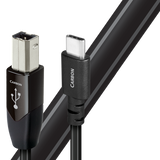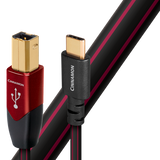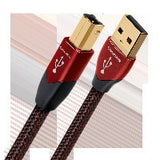AudioQuest Carbon USB C to A
Semi-Solid Concentric 5% Silver Conductors
Semi-Solid Concentric Conductors greatly reduce strand-interaction distortion and reduce jitter. Silver-plated conductors are excellent for very high-frequency applications, like USB audio. These signals, being such a high frequency, travel almost exclusively on the surface of the conductor. As the surface is made of high-purity silver, the performance is very close to that of a 100% silver cable, but priced much closer to a copper cable. This is an incredibly cost effective way of manufacturing very high-quality USB cables.
Multi-Layer Carbon-Based Noise-Dissipation
This cable's negative conductors are covered with partially conductive Carbon-Loaded Polyethylene. This remarkable material reduces radio-frequency garbage being fed back into the amplifier. The sonic benefit is exactly the same reduction in "hash" and improved dimensionality that comes whenever RF interference is reduced in an audio circuit. In addition, a carbon layer damps interaction between positive and negative conductors, and an external Carbon-Based NDS System reduces external interference.
Hard-Cell Foam Insulation
Hard-Cell Foam (HCF) Insulation ensures critical signal-pair geometry. Any solid material adjacent to a conductor is actually part of an imperfect circuit. Wire insulation and circuit board materials all absorb energy. Some of this energy is stored and then released as distortion. Hard-Cell Foam Insulation is similar to the Foamed-PE used in our more affordable Bridges & Falls cables, and is nitrogen-injected to create air pockets. Because nitrogen (like air) does not absorb energy and therefore does not release any energy from or into the conductor, distortion is reduced. In addition, the stiffness of the material allows the cable's conductors to maintain a stable relationship along the cable's full length, producing a stable impedance character and further minimizing distortion.
Direction-Controlled Conductors
All drawn metal strands or conductors have a non-symmetrical, and therefore directional, grain structure. AudioQuest controls the resulting RF impedance variation so that noise is drained away from where it will cause distortion. The correct direction is determined by listening to every batch of metal conductors used in every AudioQuest audio cable. When applicable, arrows are clearly marked on the connectors to ensure superior sound quality. For most models of AQ cable, the arrows not only indicate the direction that optimizes metal-directionality as part of Noise-Dissipation, but also indicates non-symmetrical attachment of shield and GND in order to optimize full-system performance. A fundamental aspect of AudioQuest's multifaceted Noise-Dissipation technology, Direction-Controlled Conductors ensure induced noise is dissipated and drained properly.










